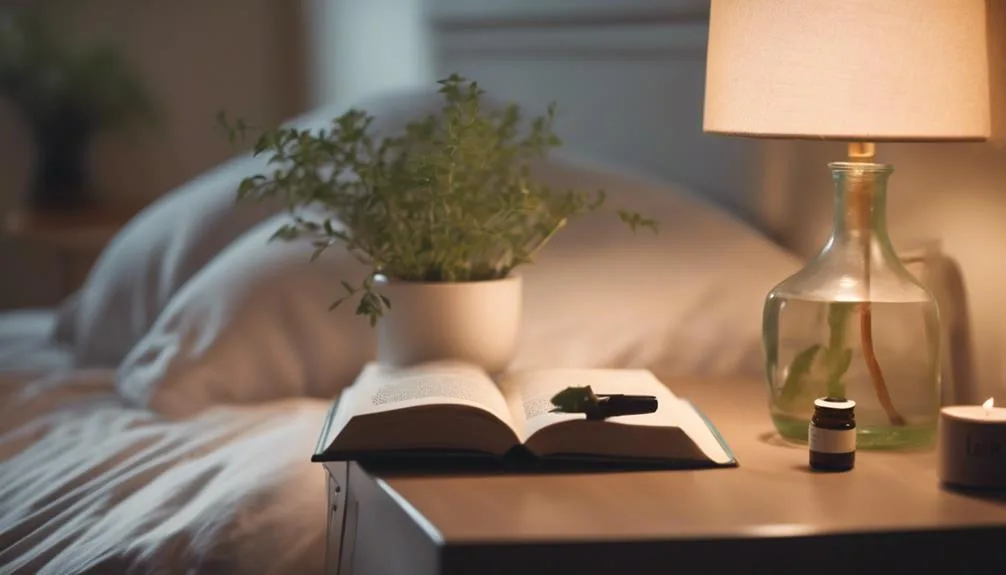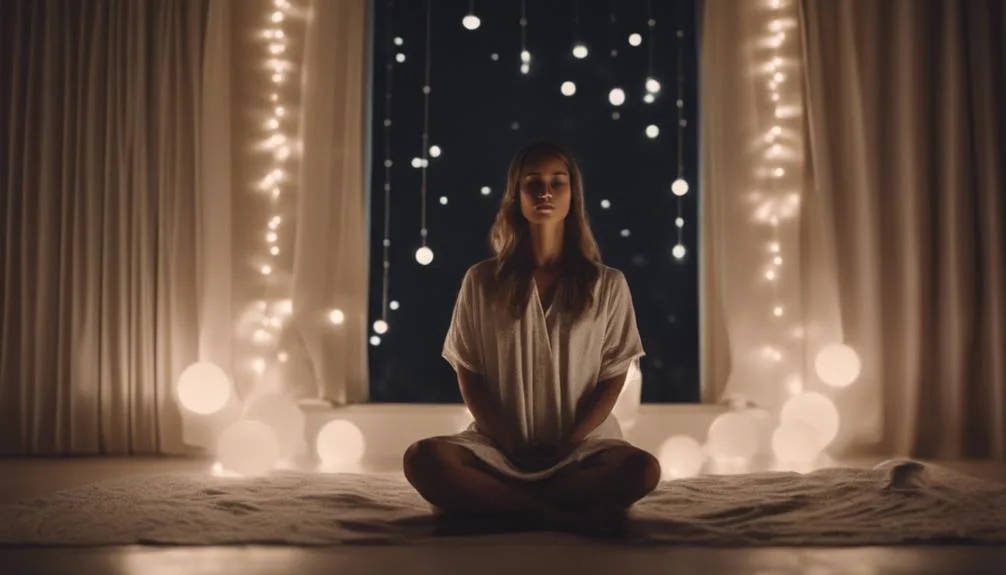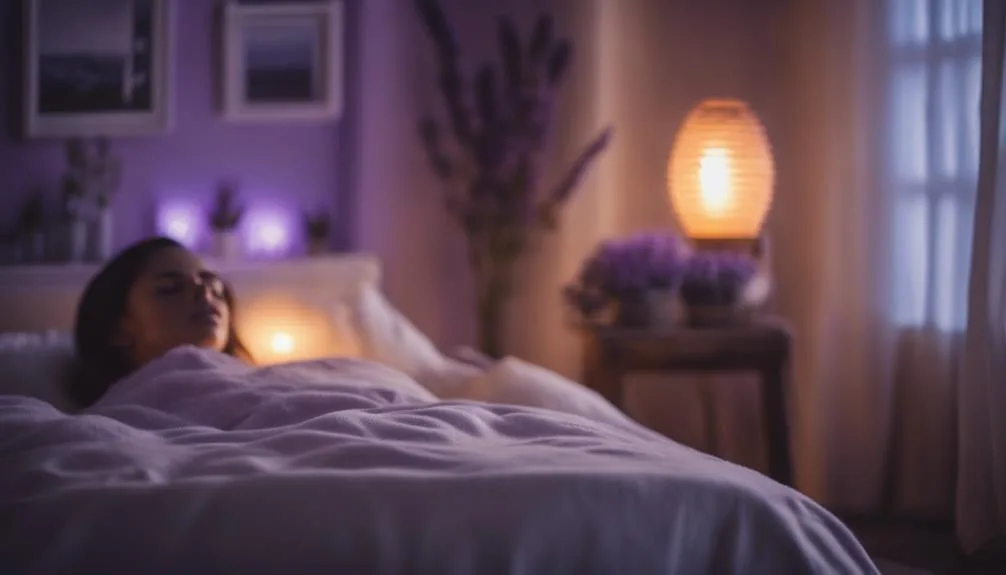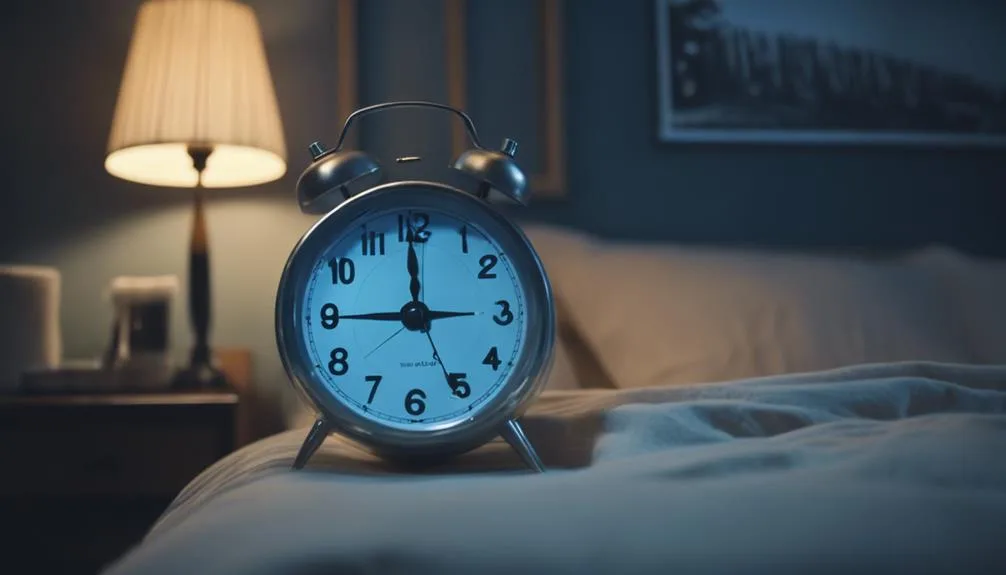Nighttime Anxiety Busters: Sleep Solutions Unveiled
As professionals delve into the complexities of nighttime anxiety, a condition that plagues countless individuals, seeking efficacious sleep solutions becomes paramount. This exploration is not only about uncovering the intricate relationship between anxiety and disrupted sleep patterns but also about presenting actionable strategies that promise relief.
The insights shared here aim to equip readers with knowledge on establishing a tranquil pre-sleep routine, embracing meditation for anxiety alleviation, and identifying symptoms unique to nighttime anxiety.
The subsequent discussion will illuminate a path towards achieving restorative sleep and a significant reduction in anxiety levels, offering a glimpse into a comprehensive approach designed to tackle both symptoms and underlying causes.
Key Takeaways
- Adopting effective sleep hygiene practices can significantly improve sleep and reduce nighttime anxiety.
- Regular meditation helps in managing anxiety by enhancing self-awareness and promoting relaxation.
- Identifying symptoms of nighttime anxiety is crucial for seeking timely and appropriate interventions.
- Comprehensive treatment combining sleep hygiene and meditation addresses both symptoms and causes of nighttime anxiety.
Understanding Nighttime Anxiety
Nighttime anxiety is a pervasive shadow that affects over half of US adults. It is characterized by feelings of worry, fear, or unease that disrupt sleep and exacerbate the cycle of anxiety. Understanding the anxiety triggers that often manifest more intensely during the solitude of the evening can be the first step towards managing this condition.
These triggers vary widely among individuals, encompassing everything from stress at work to personal insecurities or unresolved issues. Identifying one's specific triggers is crucial for developing effective coping strategies. These strategies might include mindfulness practices, cognitive-behavioral techniques, or simple lifestyle adjustments aimed at reducing stress.
The Sleep-Anxiety Connection
Understanding the intricate relationship between sleep and anxiety is crucial, as disturbances in one can significantly impact the other, leading to a vicious cycle that can exacerbate both conditions. This connection underscores the importance of addressing both elements to foster well-being. Incorporating mindfulness practices and relaxation techniques can be transformative in breaking this cycle.
| Strategy | Benefit |
|---|---|
| Mindfulness Practices | Enhances present-moment awareness, reducing worry |
| Relaxation Techniques | Lowers physical tension, promoting restful sleep |
Mindfulness practices encourage a non-judgmental awareness of the present, helping to alleviate the mental churn that anxiety produces. Relaxation techniques, such as deep breathing or progressive muscle relaxation, directly counteract the physical symptoms of anxiety, making it easier to drift into sleep. Together, these approaches offer a powerful toolkit for those struggling with the sleep-anxiety nexus.
Sleep Hygiene Essentials

Implementing effective sleep hygiene practices is crucial to combating nighttime anxiety and fostering restorative sleep. Central to this effort is optimizing the bedroom environment to ensure it is conducive to relaxation and sleep.
This involves maintaining a cool, quiet, and dark space, comfortable bedding, and minimizing potential disturbances. Equally important are the relaxation techniques that can be employed to ease the mind and prepare the body for sleep.
Techniques such as deep breathing exercises, progressive muscle relaxation, or guided imagery can significantly reduce anxiety levels, making it easier to fall asleep and stay asleep. By prioritizing these elements of sleep hygiene, individuals can create a solid foundation for improving both the quality and quantity of their sleep, thereby reducing the impact of nighttime anxiety.
Evening Wind-Down Strategies
Adopting an evening wind-down routine is a crucial strategy for alleviating nighttime anxiety and promoting restful sleep. As anxiety and sleep affect each other bi-directionally, incorporating relaxation techniques into your bedtime routine can create a peaceful transition from the day's stresses to a state of calm readiness for sleep.
A well-structured bedtime routine might include dimming lights to signal your brain that it's time to rest, engaging in gentle stretching or breathing exercises to ease physical and mental tension, and establishing a specific bedtime to regulate your body's internal clock. Such practices not only foster relaxation but also prepare your mind and body for a night of rejuvenating sleep, free from the grips of anxiety.
Meditation for Anxiety Relief

Building on the foundation of a calming evening routine, meditation emerges as a powerful tool for alleviating anxiety and enhancing sleep quality. By integrating mindfulness exercises and relaxation techniques into one's nightly schedule, individuals can create a serene mental environment conducive to rest. Meditation, in its essence, provides a pathway to quiet the mind and foster a state of peace, making it an invaluable asset for those grappling with nighttime anxiety.
- Mindfulness exercises help anchor the present moment, reducing worry.
- Guided imagery fosters a journey to tranquility, easing the mind into sleep.
- Deep breathing techniques regulate the nervous system, promoting relaxation.
- Body scan meditation releases physical tension, preparing the body for rest.
Each of these practices offers a unique approach to mitigating anxiety, paving the way for a peaceful night's sleep.
Symptoms of Nighttime Anxiety
Recognizing the symptoms of nighttime anxiety is crucial for individuals who find themselves caught in a cycle of worry and restlessness as they attempt to sleep.
This condition manifests through tossing and turning, an inability to quiet the mind from rumination and intrusive thoughts, and a pervasive worry about the forthcoming day due to anticipated lack of sleep. Such symptoms often intensify when solitude amplifies the echoes of one's anxieties.
Understanding these signs is the first step toward developing effective coping mechanisms and stress management strategies, which are essential in breaking the cycle of anxiety and promoting restful sleep.
Empathy towards oneself and a commitment to addressing these symptoms through informed measures can significantly alleviate the burden of nighttime anxiety, paving the way for more peaceful nights.
Comprehensive Anxiety Treatment

After identifying the symptoms of nighttime anxiety, it becomes essential to explore treatments that address both its manifestations and underlying causes for a holistic approach to well-being. In pursuit of a serene night, consider these anxiety management strategies for a comprehensive solution:
- Cognitive Behavioral Therapy (CBT): Targets the thought patterns and behaviors contributing to anxiety.
- Physical Activity: Regular exercise can significantly reduce symptoms of anxiety and improve sleep quality.
- Healthy Sleep Hygiene: Establishing a calming pre-sleep routine and maintaining a consistent sleep schedule.
- Professional Guidance: Consulting with a healthcare provider can tailor treatment plans that incorporate both medication and therapy if needed.
Embracing a holistic approach to anxiety management can pave the way toward restful nights and overall improved mental health.
Meditation and Brain Change
Recent studies have illuminated the profound impact that consistent meditation practices can have on brain structure and function, offering hope to those battling with nighttime anxiety.
Delving into the science behind meditation benefits reveals a fascinating brain transformation process. Regular engagement in mindfulness exercises has been shown to enhance areas of the brain responsible for self-regulation and emotional control. This restructuring not only alleviates the symptoms of anxiety but also fosters a more resilient mental state, empowering individuals to better manage stress and worry that can escalate at night.
Meditation, therefore, stands as a beacon of light for those seeking to reclaim their nights from the grips of anxiety, demonstrating that through sustained practice, profound and lasting changes in brain function and structure are not only possible but achievable.
Building a Consistent Sleep Schedule

Establishing a consistent sleep schedule is a fundamental step toward mitigating the impacts of nighttime anxiety and improving overall sleep quality. By prioritizing sleep consistency, individuals can experience numerous benefits that contribute to a healthier, more balanced life. It's essential to understand the importance of a bedtime routine in achieving this consistency.
- Sleep consistency benefits include improved mood, enhanced cognitive function, and reduced anxiety levels.
- Bedtime routine importance cannot be overstated; it signals to your body that it's time to wind down.
- Prioritize setting a fixed wake-up time every day to regulate your internal clock.
- Gradually adjust your bedtime to ensure you're getting the recommended 7-9 hours of sleep.
Frequently Asked Questions
How Can Specific Dietary Choices Before Bedtime Influence Nighttime Anxiety and Sleep Quality?
Specific dietary choices, notably reducing caffeine consumption and avoiding alcohol before bedtime, can significantly improve sleep quality and reduce nighttime anxiety. These adjustments promote relaxation and facilitate a smoother transition into restful sleep, enhancing overall well-being.
Are There Any Genetic Factors That Make Certain Individuals More Prone to Experiencing Nighttime Anxiety Than Others?
Genetic factors can indeed predispose certain individuals to nighttime anxiety, with genetic testing revealing links to specific anxiety disorders. Understanding these predispositions enables targeted interventions, fostering a more empathetic and informed approach to managing sleep-related anxiety.
How Do Environmental Factors, Such as Noise Pollution or Room Temperature, Affect Nighttime Anxiety and the Ability to Fall Asleep?
Environmental factors like noise pollution disrupt sleep, exacerbating nighttime anxiety. Optimal room temperature and thoughtful choices in lighting and bedding materials can significantly improve sleep quality, offering a serene retreat from daily stressors.
Can the Use of Essential Oils or Aromatherapy Before Bed Play a Significant Role in Reducing Nighttime Anxiety and Improving Sleep?
The integration of essential oils through various diffuser types can significantly contribute to sensory integration, potentially reducing nighttime anxiety and enhancing sleep quality through their calming properties. This approach offers a non-invasive method to improve overall well-being.
What Is the Role of Physical Exercise During the Day in Managing Nighttime Anxiety and Enhancing Sleep Quality?
Engaging in morning workouts, particularly of moderate intensity, can significantly mitigate nighttime anxiety and improve sleep quality. This physical exercise helps regulate stress hormones and promotes a healthier sleep-wake cycle, enhancing overall well-being.
Conclusion
In the garden of the mind, nighttime anxiety acts as a pervasive weed, entangling itself around the roots of restful slumber.
Yet, through the cultivation of sleep hygiene, the nurturing embrace of meditation, and the diligent care in establishing a consistent sleep schedule, individuals can till the soil for a healthier mental landscape.
This holistic approach to managing nighttime anxiety not only illuminates the path to tranquility but also fosters a sanctuary where the seeds of well-being can flourish, undisturbed by the shadows of unrest.






